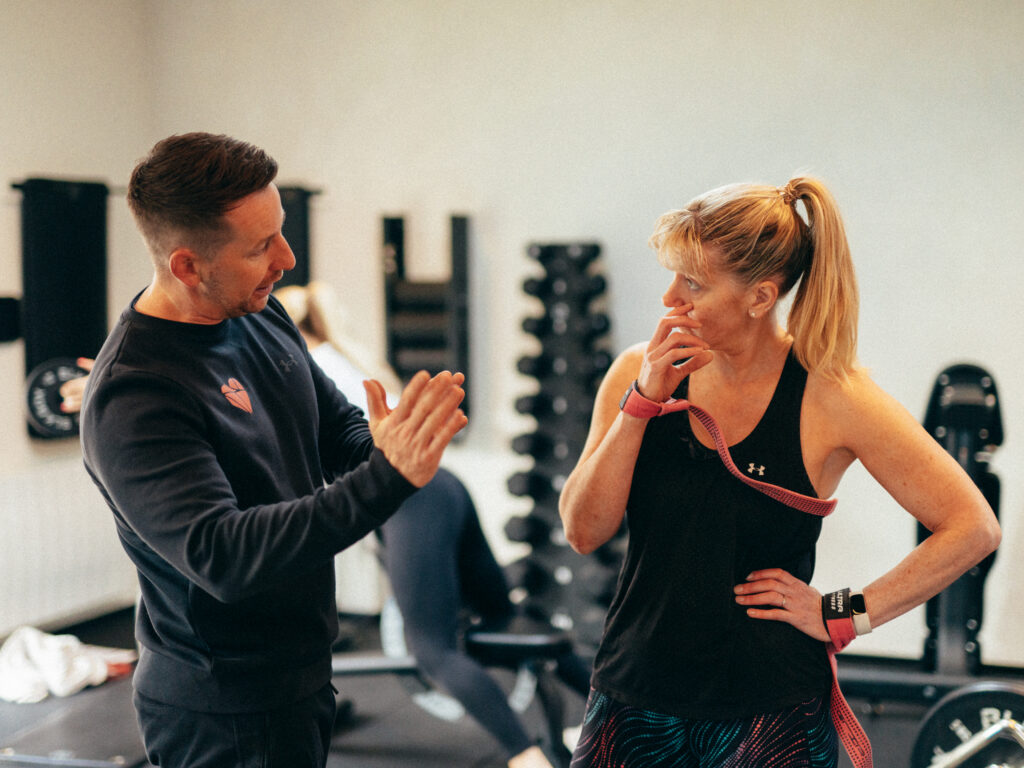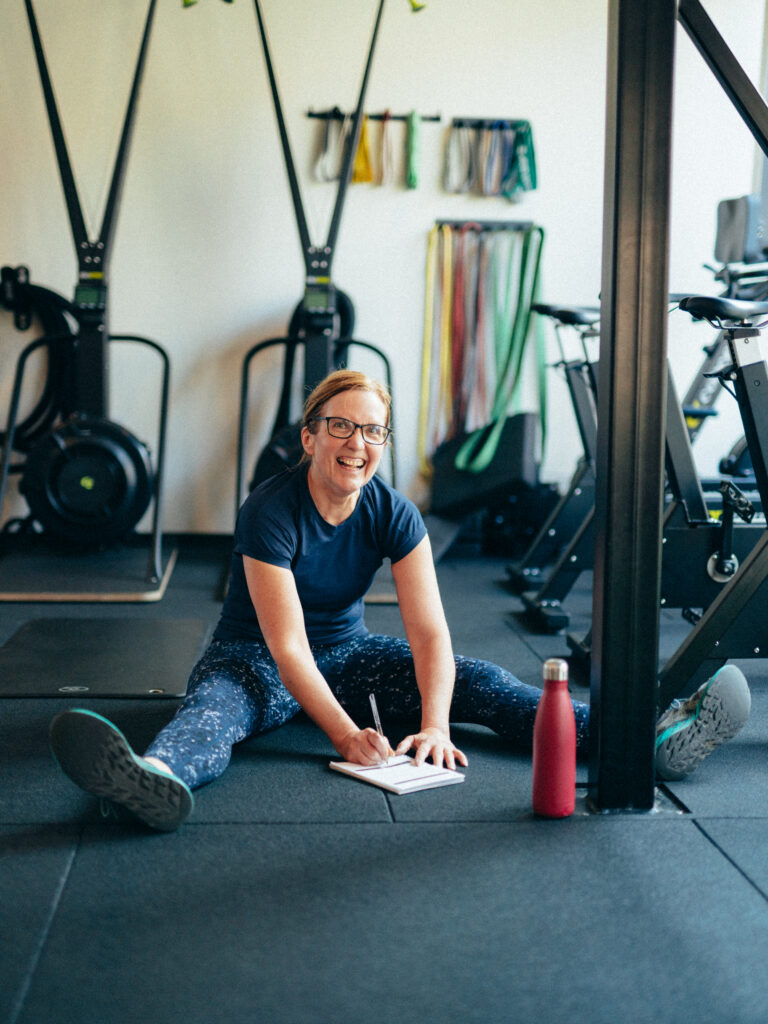If you’re in your 40s, 50s or beyond, chances are life feels a lot fuller than it used to. Work, kids, ageing parents, jobs that never switch off, and sleep that sometimes disappears for absolutely no reason… it all adds up. If you often wonder how to exercise when tired, you’re not alone – especially if you’re over 40.
So when you’re already stretched thin, the idea of “pushing harder” in the gym can feel like the cherry on top of a stress-cake you didn’t order.
But here’s the good news:
When you’re tired or stressed, the right kind of exercise can actually calm you down, lift your energy, and help you sleep better.
The wrong kind just leaves you feeling like you need a nap, a holiday, or both.
At Power, we coach people who haven’t been in a gym for years — sometimes decades. And the thing we hear most often is:
“I thought I’d be dying after this… but I actually feel better.”
Why stress makes exercise feel 10x harder
As we get older, our body responds differently to stress. When you’re overwhelmed, your nervous system switches into “fight or flight”. That means:
- Muscles feel tighter
- Joints feel grumpier
- Sleep is lighter
- Energy is unpredictable
- Motivation does a disappearing act
So if you’ve ever thought, “Why does this feel so much harder than it should?” -it’s not you.
It’s biology.
And no, you don’t need to punish yourself with a brutal workout to “make up for it”. That approach is about as helpful as trying to fix tiredness with three espressos and a biscuit (we’ve all been there).
The answer is calmer, smarter training.

How to train when you’re stressed or low on energy
1. Slow the pace, build the quality
Fast and frantic is overrated. Slower, controlled strength work builds muscle without overwhelming your system.
Think of it like this:
Would you rather sprint up a hill… or take a steady walk and enjoy the view?
Your nervous system votes for option two every time.
2. Lower the intensity, keep the consistency
On tired days, a gentler session still “counts”. In fact, it often counts more because it keeps the habit alive.
Instead of skipping, try:
- Taking it slower in your PT, sessions don’t have to break you for benefit
- A relaxed walk
- A light bike session
- Dropping into our stretch class
Consistency beats intensity – especially over 40.
3. Sprinkle in movement that calms your body
Gentle mobility, stretching and controlled breathing are like pressing the “reset” button for your nervous system.
They help you:
- Feel less tense
- Move more easily
- Sleep more deeply
- Lower stress
- Boost your mood
Even 5 minutes can change the whole tone of your day.
4. Judge the session by how you feel afterwards
A good session should leave you feeling:
- Lighter
- Looser
- More grounded
- Less wound-up
If you leave the gym feeling like you need to lie down in a quiet, dark room… that was the wrong kind of workout for your stress level.
5. Stop comparing yourself to the “old you”
You’ve lived more life.
You’ve got more responsibilities.
Your body has changed (completely normal).
You’re not training the you from 20 years ago.
You’re training the you from today — and that person has wisdom, awareness, and a much better sense of humour.
At Power, we always say:
You’re not starting from scratch. You’re starting from experience.
A real example from Power
One of our members, Sarah (52), joined feeling worn out, anxious, and unsure she’d manage anything more than a one session a week
She said:
“Please don’t expect miracles – I’m running on fumes.“
So we didn’t. We started calm: slow strength work, mobility, showing up. No pressure.
A month later she said:
“I feel less tense. I’m moving better. I’m not as overwhelmed… and I actually want to come.”
She didn’t train harder.
She trained smarter.
And yes – she still laughs about the fact she thought she’d need an ambulance after session one.
Why steady, consistent training works better long-term
The people who get the biggest results at Power are rarely the ones who go the hardest.
They’re the ones who:
- Train at a pace that suits their life
- Avoid the “all or nothing” mindset
- Listen to their body
- Show up even when they’re tired
- Build confidence slowly but steadily
- Avoid Injury
And over time, they feel stronger, more mobile, less stressed, and far more capable in everyday life.

If EXERCISING feels overwhelming right now… let’s make it simple
Most people over 40 think they need to get fit before joining a gym.
But the truth is this:
You start exactly where you are -tired, stressed, nervous – and you build from there.
If you want help finding the right approach, we offer a simple chat to see if Power is the right fit. No pressure. No guilt. No pretending you love burpees (we don’t either).
FAQ: Common Questions People Over 40 Ask About Exercising When Stressed
Is it okay to exercise when I’m tired or stressed?
Yes – as long as the session is low to moderate intensity. The right approach can reduce stress and improve sleep.
Should I avoid high-intensity workouts when stressed?
Temporarily, yes. HIIT can spike stress hormones, which isn’t ideal when you’re already overwhelmed.
What’s the best exercise for stressed, tired adults over 40?
Slow strength work, walking, mobility, and gentle cardio. They help your body calm down while still improving fitness.
Will a gentler approach still make me stronger?
Absolutely. Consistency is the real power move, not intensity.
Ready to Feel Better?
Exercise shouldn’t leave you wiped out or overwhelmed.
Done right, it should help you feel calmer, stronger and more capable in your everyday life.
So if you’re stressed, tired or unsure where to start, you’re not alone -and you don’t need to figure it out by yourself.
If you want support, clarity and a coaching team that understands people over 40, book a chat and let’s see if Power is the right fit.
One conversation might be the turning point you didn’t know you needed.

